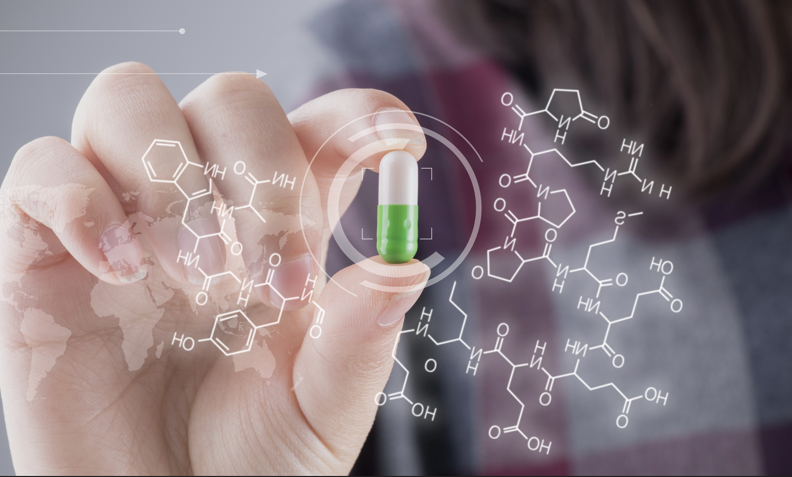PharmaSourcesSeptember 11, 2023
Tag: FAQs , Pharmaceutical Intermediates , API
Pharmaceutical intermediates are foundational elements in the development of active pharmaceutical ingredients (APIs). These chemical compounds are regularly used in the mass production of many types of drugs and, hence, play a significant role in the pharmaceutical and many other industries. Read on to explore what pharmaceutical intermediates are, their types and categories, applications, and more.

Pharmaceutical intermediates, as mentioned above, are chemical compounds that serve as building blocks in the synthesis of APIs and other pharmaceutical products. They are not the final drug products that consumers use but rather the crucial steps in manufacturing medicines. These intermediates undergo further chemical reactions to form the desired APIs, which are then formulated into drugs.
Pharmaceutical intermediates have several different types and categories. Each type/category has its unique characteristics and applications. These types/categories include the following:
Aryl Halides: These intermediates contain halogen atoms (e.g., chlorine, bromine, or iodine) attached to an aromatic (aryl) ring. They are often used in the synthesis of drugs like antipsychotics and anti-inflammatory agents.
Aldehydes and Ketones: Aldehydes and ketones are versatile intermediates used in the synthesis of a wide range of pharmaceuticals. They serve as starting materials for reactions such as reductions, condensations, and rearrangements.
Amino Acids and Peptides: Amino acids and peptides are essential intermediates for the production of protein-based drugs, including antibodies and hormones. Solid-phase peptide synthesis is a common method used to create peptides.
Esters: Esters are common intermediates in the pharmaceutical industry, often used in the production of antibiotics, analgesics, and cardiovascular drugs. They can be derived from carboxylic acids and alcohols.
Alcohols and Phenols: These compounds serve as intermediates in various drug syntheses, including those for antiviral drugs and anesthetics. They can be modified through oxidation or reduction reactions.
Heterocycles: Heterocyclic intermediates contain one or more heteroatoms (such as nitrogen, oxygen, or sulfur) within a ring structure. They are crucial in the synthesis of a wide range of drugs, including antibiotics, antivirals, and anti-inflammatory agents.
Chiral Intermediates: Chiral intermediates are optically active compounds that contain a chiral center. They are essential for the production of enantiomerically pure drugs, which are often required to avoid unwanted side effects.
Oxidation and Reduction Intermediates: These intermediates involve the addition or removal of oxygen or hydrogen atoms from organic molecules. They are used in the synthesis of drugs such as analgesics and antihypertensives.
Isocyanates and Isothiocyanates: These intermediates are used in the synthesis of drugs, including carbamates, ureas, and thioureas. They can react with amines to form urea derivatives or with alcohols to form carbamate derivatives.
Nitriles: Nitrile intermediates are used in the synthesis of a variety of pharmaceuticals, including anticancer drugs and antifungal agents. They can be hydrolyzed to form carboxylic acids.
Organometallic Compounds: These intermediates contain metal atoms bonded to organic groups. They are used in various catalytic reactions for drug synthesis.
Pharmaceutical intermediates have many applications in various industries. They enable the production of high-quality, effective products that benefit society at large. Their applications include (but are not limited to) the following:
API Synthesis: Pharmaceutical intermediates are primarily used in the synthesis of active pharmaceutical ingredients (APIs). They serve as precursor molecules or building blocks in the chemical reactions that lead to the formation of the final drug compounds. Intermediates enable chemists to control the synthesis of complex molecules efficiently.
Chemical Diversity: Intermediates provide a diverse range of chemical structures and functional groups, allowing for the creation of a wide variety of drug molecules. This diversity is essential for developing drugs to treat different medical conditions and target specific biological pathways.
Purity and Quality Control: Intermediates are used to develop and optimize synthetic routes for APIs. This optimization process includes purification steps to remove impurities, ensuring the final drug product meets strict quality and safety standards set by regulatory agencies like the FDA.
Chiral Resolution: In many cases, pharmaceutical intermediates are used to synthesize enantiomerically pure compounds. Chirality is crucial in drug development because different enantiomers of the same compound can have vastly different biological activities and effects. Intermediates are modified to produce the desired enantiomer, reducing the risk of unwanted side effects.
Process Development: Intermediates play a critical role in the development of scalable and cost-effective manufacturing processes. Chemists and engineers work with intermediates to design and optimize synthetic routes that are efficient, environmentally friendly, and economically viable for large-scale production.
Generic Drug Development: Intermediates are important in the development of generic versions of branded drugs. Generic manufacturers often need to reverse-engineer the synthesis of APIs and intermediates to produce lower-cost versions of medications once patents expire.Conclusion – Having Access to Reliable Sources is Crucial
Overall, pharmaceutical intermediates, with their many types and categories, are the backbone of drug development and production across various sectors. Their significance in ensuring the availability of safe and effective medicines is undeniable. From starting materials to advanced intermediates and pharmaceutical building blocks, these compounds are instrumental in developing valuable products.
When it comes to acquiring pharmaceutical intermediates for product development, having access to reliable sources and suppliers in the industry is crucial. Fortunately, many reputable platforms exist that are designed to help companies in this regard. At PharmaSources, we are a trusted global platform that provides valuable information about pharmaceutical products, intermediates, and APIs and connects companies with trusted suppliers in the pharma industry. Our platform makes it easy for pharma companies to find authentic suppliers and delivery services and get up-to-date information regarding desired products.
A large database of pharmaceutical products, APIs, and intermediates
A global network of trusted suppliers
User-friendly platform interface and navigation
Industrial insights into the global pharmaceutical sector
Latest and updated information about products, suppliers, and delivery services
Professional service team and dependable customer support
Visit Pharma Sources’ website today to learn more about the platform and our key offerings.


Contact Us
Tel: (+86) 400 610 1188
WhatsApp/Telegram/Wechat: +86 13621645194
+86 15021993094
Follow Us:




 Pharma Sources Insight July 2025
Pharma Sources Insight July 2025


